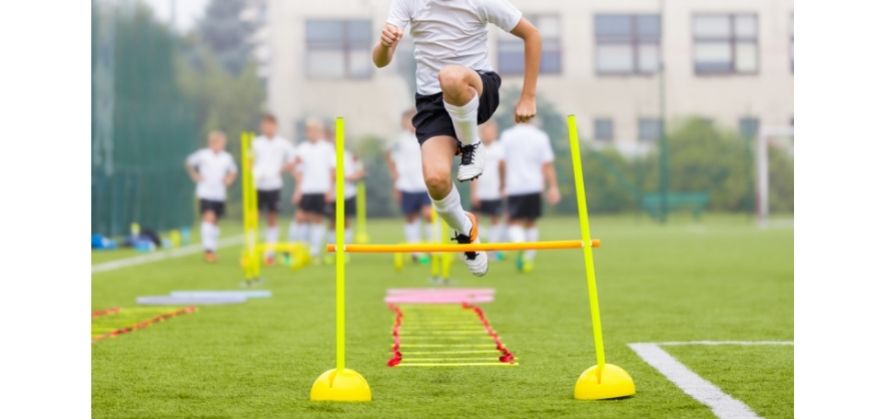The globally recognized sport known as soccer is a ball sport that involves two teams striving to score as many goals as possible.
Goalposts are stationed on opposing ends of the soccer field and the aim is to get the ball into the net using techniques such as dribbling, passing and shooting.
Due to the physical demands incorporated into the game, soccer is a hard sport as players need to be swift in making game-defining decisions.
The quick transitions between defense and attack require a high level of cardiovascular endurance.
The classification on the difficulty of a sport can be determined by the skills and techniques required to succeed in comparison to other sports.
But before we get into that, we shall offer our readers a short summary of the overall topic.
Soccer is a hard sport that requires a combination of many different skills to be able to perform at the highest competitive levels. Players must be in peak physical condition to withstand the lengthy duration of complete seasons, whilst also possessing the ability to concentrate and make quick decisions during games.
In the section below, we will dive into a specialized ranking scheme created to determine the relative difficulty of a particular sport.
Is soccer a hard game?
In order to accurately portray how difficult soccer is, the athletic abilities used in the sport must be identified and weighed against other sports.
One of the metrics created for this purpose is known as ESPN’s Ultimate Degree of Difficulty Grid.
This ranking grid was formed by a panel of sports scientists from the United States Olympic Committee that identified 10 categories that go into athleticism.
The categories are listed as follows:
- Endurance
- Strength
- Power
- Speed
- Agility
- Flexibility
- Nerve
- Durability
- Hand-eye coordination
- Analytic aptitude
In order to determine the values for each of these skills, eight panelists were chosen and asked to assign a value from 1 to 10 based on their expertise observing these sports.
The Ultimate Degree of Difficulty Grid is a result of the total and average of all the responses weighted on a 1 to 100 scale.
A higher number on the grid would translate to a harder difficulty.
From these rankings, soccer is regarded as the third most difficult sport with a difficulty rating of 68.375.
This is a very high score and the only other sports rated higher are boxing (72.375) and ice hockey (71.750).
If you’re interested on the overall ranking scheme why not head to ESPN for the full analysis.
The physical intensity of soccer is no joke to scoff at and very few professional athletes are able to transition into the sport successfully.
A perfect example of this is when the fastest man in the world, Usain Bolt, was unable to make a name for himself in the world of soccer after his retirement from track and field.
In his first season for Central Coast Mariners FC, Bolt struggled to make it into the first team and only managed to get 2 goals in a friendly against a Sydney 3rd division side.
This may seem as a decent attempt in hindsight but the team is almost eight tiers below the A-league.
Why is soccer such a hard sport?
Now, let’s dig into exactly why this sport is considered so difficult.
First up…
1. Easy to learn the basics, but hard to master

Soccer is one of the sports that does not require innate talent for an aspiring player to succeed.
In fact, most professional players have gone through the academy level at some point in their lives and practiced their skills at a young age.
Compared to other sports that may require specialized equipment such as boxing and hockey, soccer only requires a ball.
However, rising to the highest level of competition in this sport requires a unique flair to separate an individual from other players.
Most average players will have common attributes such as speed and strength but those that truly excel in the sport will master a specific attribute or several with a high degree of expertise.
2. Requires high fitness levels

A soccer match will normally run for 90 minutes separated into 2 halves of 45 minutes and can even run for 120 minutes depending on the state of the match.
This physical intensity requires a high level of cardiovascular endurance for players to last the full 90 minutes without having a significant drop in their performance.
Additionally, teams are only allowed to make 3 substitutions and at times managers can go a whole match without making a single substitution.
This essentially means that majority of the players end up playing the whole game which puts a lot of strain on their bodies.
The combination of short bursts of speed and long-distance runs demands plenty of stamina from the players as there are only small rest breaks in between transitions.
Players are rarely given the luxury of walking on the pitch as modern teams require all players to give their all to get the ball.
3. Game physicality that calls for lots of strength

Over the years, tactics have adapted to accommodate more styles of play and one of the key attributes of this change is physicality.
Physically adept players are capable of holding onto the ball for longer periods of time compared to weaker players.
For certain positions such as defenders and strikers, this is a crucial attribute as a striker needs to defend the ball from oncoming players and shield themselves to find the space to take a shot.
In the same regard, defenders need to be able to take the ball away from attackers and this ability is heavily reliant on the physical strength required to shove your average soccer player.
4. Longer soccer seasons
A typical soccer season lasts for around 9 months which is relatively long compared to other sports.
Players usually get a break of about 3 months but even then this may not happen in the event of an international sporting event.
The main reason behind the prolonged playing season is the regularity of international football.
Majority of the players playing in the top leagues such as the Premier League and La Liga will have players that represent their respective countries on the international stage.
This means that players must balance both domestic and international competitions which results in tight schedules with little to no adequate recovery time.
Traveling to different countries in the span of a couple days tends to put a lot of strain on the players due to the jet lag and overall fatigue.
Managers try to counter this by giving occasional rests to key players but at times this is not enough to prevent injuries.
5. Unpredictable ball movements

Most onlookers tend to think that since a soccer ball is fairly large in size, kicking the ball isn’t a difficult task.
Well on the contrary, the movement of a soccer ball can be very unpredictable at times due to the sheer pace at which the ball travels.
Deflections that lead to goals are a common occurrence in today’s game as players are simply unable to react to the movement of the ball which can reach speeds as high as 80 miles per hour.
Another factor to consider is that a soccer ball is not completely spherical in shape and players sometimes have to kick the ball at specific angles to attain the desired direction and power on the ball.
Without precise contact on the ball, players can encounter situations where the ball goes out of bounds or to the wrong player which can easily turn into a game-defining moment.
6. Offensive and defensive concentration
Both attacking and defensive players must contribute to the overall offensive play of the team depending on the flow of the game.
These quick transitions between styles of play require a consistent level of focus and can be both physically and mentally draining due to the high intensity of the game.
In the event of a team trailing in a game, the defenders may be forced to focus more on attack rather than their natural inclination to defend.
This is particularly evident during set pieces that take place towards the end of the game where its even possible to spot the goalkeeper heading to the attacking third.
Players need to be versatile in such situations as the flow of the game tends to change fast and its important for players to respond in quick succession.
7. Involves quick thinking and decision making

Due to the fast pace of the game, players only have a small period of time to make a move with or without the ball.
A soccer team needs incisive players that are capable of making important decisions in the game as each player has a role to play for the team to succeed.
This applies to both attackers and defenders as attackers need to be cunning in order to fool the defenders whereas defenders need to anticipate the movements of an attacker and where they are most likely to kick the ball.
As the tactics in the game are constantly changing, players are called to reinvent their gameplay as the same tactics only work for so long until the opponents have mastered counterattacking measures.
Is soccer an easy sport?
For those that aspire to pursue soccer whether casually or professionally, the training process is relatively simple as anyone can play soccer regardless of age.
This is primarily due to no need for specialized training equipment as individuals only need a soccer ball to get themselves started.
Final thoughts
All in all, soccer is a sport that incorporates various elements of athleticism that demand the highest level of fitness from professionals.
Soccer is definitely one of the hardest sports as players need to have both physical and mental strength to deal with the fast-paced flow of the game.
If you enjoy the content that I create and would like to buy me a coffee, then I’d really appreciate it!
Any money that I earn through this donation will be re-invested into more content for this website.
Additionally, by sending in a donation you’ll also receive a copy of my recently released 190+ page eBook on Soccer Ball Care, as well as be subscribed to our mailing list where you’ll be regularly informed on the latest developments concerning the Soccer Whizz blog.
- Future Icons: Europe’s Emerging Midfield Maestros Set for Glory - December 4, 2023
- Kickstarting a Revolution: How Soccer Transformed the United States Over the Last Four Years - October 7, 2023
- 4-1-4-1 Soccer Formation [Analysis] - September 23, 2023

